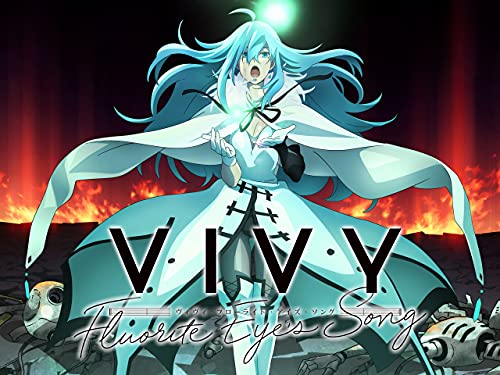Continuing the latest trend of great titles that are not based on manga, “Vivy: Fluorite Eye's Song” was written by Tappei Nagatsuki and Eiji Umehara, and was later adapted into a manga and a novel series.
Buy This Title
on Amazon
The story takes place in a future where humans, after numerous experiments with creating autonomous AI, concluded that they can only be truly functional if they were given a single mission to dedicate their lives to. With that in mind, the first autonomous AI, a songstress named Diva, was created with a mission to make people happy with her songs. However, Diva's quest to sing on the main stage of the theme park NiaLand is disrupted by the arrival of Matsumoto, an AI from 100 years in the future who tells her of a world where AI have decided to eradicate humanity, and wishes to join hands with her to prevent it. Thus begins a “trip” that takes up a number of decades, as Matsumoto repeatedly appears in Diva's life, after absences that last many years, and instigates her to use her alternative persona, Vivy, in order to prevent catastrophes that led to the aforementioned disaster, without, though, making changes that affect the future outside of this outcome. Their effort proves rather difficult, while Diva learns even more about herself, Toak, an Anti-AI organization, and the whole concept of artificial intelligence.
The narrative approach Shinpei Ezaki implements here, with each one of Matsumoto's appearances essentially starting a new arc, which is, though, part of the overall story, works exceptionally well, as it allows the presence of both new and recurring characters, and the presentation of a number of different and rather interesting comments, which gain an even additional level if AIs are perceived as a metaphor for immigrants. In that regard, the first arc deals with a politician who tries to gain the favour of the populous votes by attempting to implement the AI Naming Law which grants AI some level of human rights. The second focuses on Estella, a “lifekeeper” AI and the younger sister to Vivy, who was accused of crashing the orbital space hotel she owned on Earth. The third takes place on a fully automated factory island and focuses on Tatsuya, a former Toak member and the first human married to an AI. Not to give away the whole story, the narrative continues in that fashion, with each arc also seeing a different change in Diva, some of them quite sad, thus adding an element of drama to the series as the analysis of the main character becomes more and more thorough.
In yet another level/comment, the anime also deals with the concept of pop idols and the impact they have on their audience, but also the struggles they have to face before, during, and after they reach stardom. The arc with Ophelia and the last one highlight these comments in the most eloquent fashion, adding even more context to the series, while also allowing for a promotion aspect, through the plethora of songs heard, which are though, embedded in the story and never feel overly advertising.
Apart from context, however, the anime also thrives on its technical aspects. The action is frantic, including both hand-to-hand combat, guns, flying machines and everything in between, with the work done by Wit Studio and particularly chief animation directors Takuma Ebisu and Yuichi Takahashi, being top notch, in a cyberpunk style. The same applies to the character design, with Takahashi's work resulting in a number of easily distinguishable protagonists, despite their plethora, while the “cubism” of Matsumoto also works great, as much as his frantic monologues. The impressive colors fit the general aesthetics of the title to perfection, with the blue and white hues dominating. The sole issue in the art department is that the characters look quite plain when the “camera” depicts them from afar, with the complete opposite, however, happening in the close ups.
“Vivy: Fluorite Eye's Song” is another excellent title by Wit Studio, which also highlights its diversity outside the sword and magic premises of “Attack on Titan” and “Vinland Saga” and the historical/shonen of “Golden Kamuy” and definitely one of the best of 2021.

















